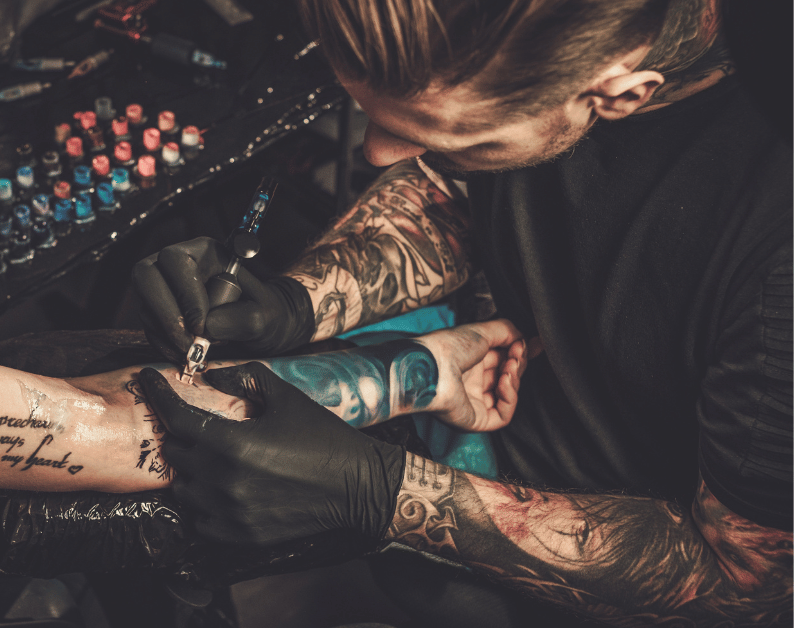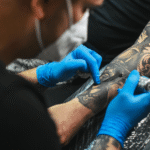Most tattoo studios make the same mistake, they focus entirely on “tattoo near me” searches and miss out on a goldmine of potential clients. Here’s the thing: topical authority is your secret weapon for ranking higher and attracting more qualified customers. It’s about becoming the go-to resource in your niche, not another shop competing for the same generic keywords.
At Tattoo Digital Marketing, we’ve seen studios transform their online presence by building comprehensive content that covers every aspect of their craft. When Google sees your site as an authority on tattoo-related topics, you’ll rank for hundreds of related searches, from specific styles to aftercare questions that potential clients are asking every day.
Why Topical Authority Matters For Tattoo Studios
Think about how Google works nowadays. The search engine doesn’t reward single-page websites targeting one keyword anymore. Instead, it favors sites that demonstrate deep knowledge across related topics through semantic relevance.
Let’s say someone searches for “Japanese dragon tattoo meaning.” If your studio has comprehensive content covering Japanese tattoo history, symbolism, traditional techniques, and cultural significance, Google recognizes you as an authority. You’re not competing against massive tattoo directories, you’re building a moat around your expertise.
Domain authority used to be king, but topical authority levels the playing field. A small studio with focused, in-depth content can outrank established competitors who neglected their content strategy. This shift means you can compete with bigger studios by being smarter, not bigger.
Define Your Tattoo Studio’s Core Topics
Before creating content, map out your thematic buckets. Think beyond basic services, what makes your studio unique? Maybe you specialize in fine-line work, traditional American styles, or cover-ups. Each specialty becomes a pillar topic.
Your core topics might include:
- Tattoo styles (Japanese, realism, fine-line, traditional)
- Aftercare and healing processes
- Tattoo safety and hygiene practices
- Consultation and design processes
- Local culture and artistic inspiration
Use topic-based keyword research to uncover what people actually ask. Tools reveal questions like “how long do fine-line tattoos take to heal?” or “what’s the difference between traditional and neo-traditional styles?” These questions become your content roadmap.
Don’t forget seasonal angles. Summer brings aftercare concerns about sun exposure and swimming. Winter might focus on clothing considerations and healing in dry weather. Your SEO strategy should capture these natural search patterns.
Build Depth With Subtopics and Unique Angles
Here’s where most studios fall short, they create surface-level content. Instead, drill down into specifics. If realism is your specialty, don’t stop at “we do realistic tattoos.” Create subtopics that answer every related question:
- “What makes realism tattoos fade faster than other styles?”
- “Aftercare differences for black-and-gray vs color realism”
- “How to choose reference photos for realistic portraits”
- “Realism tattoo touch-up timeline and expectations”
Each subtopic becomes a content cluster supporting your main realism pillar. This comprehensive coverage signals expertise to both Google and potential clients. When someone researches realism tattoos, they’ll find multiple helpful resources on your site.
Consider your artists’ unique perspectives too. Maybe one specializes in botanical realism while another focuses on portraits. These individual angles create natural content differentiation that competitors can’t easily replicate.
Craft Comprehensive Content That Satisfies Searcher Intent
Stop thinking like a tattoo artist and start thinking like your clients. They’re not searching for technical jargon, they want practical answers to real concerns. “Will this hurt?” “How do I care for it?” “What if I don’t like it?”
Create problem-solving content that addresses these anxieties. Write guides that walk through the entire process, from initial consultation to fully healed artwork. Include visuals, healing progression photos, style comparisons, and aftercare infographics that people can save and reference.
Artist Q&As work incredibly well. Let your team share their expertise through interviews about their specialties, creative processes, or career journeys. These authentic voices build trust while creating unique content that showcases your studio’s personality.
FAQ sections might seem basic, but they’re goldmines for long-tail keywords. Compile questions from consultations, social media comments, and phone calls. Turn each question into detailed, helpful content that demonstrates your knowledge and care for client concerns.
Strategically Link Content For Authority and User Experience
Internal linking transforms isolated blog posts into a cohesive authority-building machine. When you publish that realism aftercare guide, link it to your main realism services page, your general aftercare resource, and relevant artist portfolios.
Think of it as creating pathways through your expertise. Someone researching Japanese tattoo meanings should easily find your Japanese-style artist bios, your traditional technique explanations, and your portfolio of completed work. This linking structure helps Google understand your content relationships while keeping visitors engaged longer.
Don’t forget to link back to your core website design elements, your booking page, consultation forms, and service descriptions. Educational content should naturally flow toward conversion opportunities without feeling pushy or sales-heavy.
Maintain and Expand Content Over Time
Topical authority isn’t a one-time project, it’s an ongoing commitment. Tattoo trends evolve constantly. Fine-line work has exploded in popularity recently. Minimalist designs are having a moment. Your content strategy needs to adapt and grow with these trends.
Regular updates keep your existing content fresh and relevant. That aftercare guide from two years ago might need updates based on new product recommendations or revised healing timelines. Search engines reward sites that maintain current, accurate information.
Track which content performs best and why. Maybe your color tattoo guides generate more traffic than black-and-gray content. Double down on what works while identifying gaps in underperforming topics. This data-driven approach ensures your content investment delivers maximum returns.
Earn Trust and Visibility Through External Signals
Enhanced EEAT (Experience, Expertise, Authoritativeness, Trustworthiness) signals help Google understand your credibility. Include detailed artist bios highlighting their training, certifications, and specialties. Professional headshots and portfolio credits add authenticity.
Schema markup helps search engines understand your content structure. Mark up your FAQs, services, and local business information. This structured data can earn rich snippets in search results, increasing your visibility and click-through rates.
Monitoring and Measuring Topical Authority
Success metrics go beyond simple traffic numbers. Monitor how many pages rank for each topic cluster. Are you showing up for various realism-related searches, or are you still limited to basic service terms?
Tools like Google Search Console reveal which queries trigger your content. Look for unexpected keyword opportunities, maybe you’re ranking for aftercare questions you hadn’t considered. These insights guide future content expansion and paid advertising targeting.
Building Your Content Strategy Foundation
The most successful tattoo studios we work with at Tattoo Digital Marketing combine authoritative content with smart social media marketing and technical optimization. This integrated approach builds lasting online authority that attracts qualified clients and supports premium pricing.
Ready to build topical authority that ranks higher and converts better? Schedule a consultation to develop a content strategy that positions your studio as the definitive authority in your specialties













